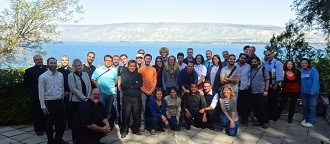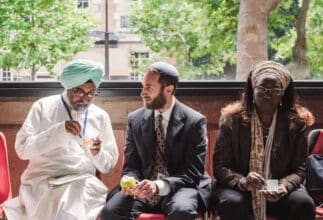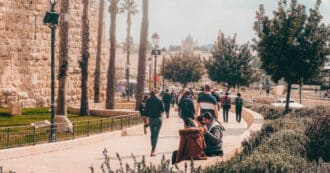The Jordan River holds religious significance for Jews, Muslims, and Christians, which served to unite an interfaith group of clergy and seminarians at the recent Partnering in Good Faith Jordan River Seminar. The site of the Israelites passage into the Promised Land, Jesus’s baptism, and the final resting place of many of the Companions to the Prophet Muhammad; this body of water now barely resembles a river ecosystem, let alone a holy site for three major world religions. Around 96% of the Jordan’s natural flow has been diverted by Israelis, Jordanians and Syrians, and today the small amount of water that flows through the holy river includes sewage, diverted saline streams and agricultural runoff.
For many, the man-made disaster reflects our disconnect and disregard for the natural world and our failure to act responsibly as custodians of God’s earth. The unique Partnering in Good Faith Seminar served to inspire a group of multi-faith spiritual leaders to act towards rehabilitating these life-giving waters.
On March 31st, 2014, a group of Jewish and Christian seminary students, clergy, and others spent a day at the Jordan River in a seminar organized and facilitated by the Interfaith Center for Sustainable Development (ICSD) and Friends of the Earth Middle East (FoEME – www.foeme.org). The day began at the Yardenit baptismal site where Christian pilgrims from across the globe come to follow the steps of Jesus and be baptized in a beautiful, healthy river oasis. Elizabeth Koch-Ya’ari, Jordan River Projects Coordinator at FoEME’s Tel Aviv office, introduced the seminar and the ecological challenges facing the River, and then Rabbi Yonatan Neril, founder and executive director of ICSD, led icebreaker activities. Taking a twenty-minute hike to the Alumot dam, the group saw where the Jordan ceases to flow with the gentle yet mighty force, and is reduced to a stream of sludge. While the dramatic reduction in size was certainly shocking to the participants, it was the overwhelming smell of human sewage that was undoubtedly the most unsettling and notable change to the river.
As shocking as the sewage flowing into the river is, Alumot dam also serves to highlight the importance of raising voices to call upon regional decision makers to implement sanitation solutions for communities along the Jordan River to take the sewage out of the river and return freshwater resources to the River. At Alumot, visitors were pleased to see that the Israeli Water Authority is now allowing a small but significant amount of fresh water to flow back to the Lower Jordan River – the first fresh water returned to the river in 49 years! (http://foeme.org/peace.php?id=109) This change, Elizabeth explained, is largely due to the large number of residents and visitors from around the world that have called upon leaders to rehabilitate the river. FoEME’s faith based campaign provides information and practical guidance to communities in the region and around the world to raise their voices to call upon regional decision makers to rehabilitate the Jordan.
The next stop on the tour, known as Old Gesher, was a pleasant contrast to the previous site. Elizabeth explained that while the river remains polluted, the area is also a place of hope as the location of a joint initiative where Jordanian and Israeli stakeholders (including local authorities, community businesses, and FoEME) are working together to develop the area to become the future home of the transboundary Jordan River Peace Park. Among a host of benefits, this project would advance the rehabilitation of the Lower Jordan River, create economic and job opportunities and protect the numerous cultural and natural heritage sites located throughout the proposed Jordan River Peace Park.
The tour made its final stop at Ohalo where the participants engaged in an intriguing conversation over lunch on the shores of the Sea of Galilee. Then the group delved into the spiritual significance of the Jordan River. Rabbi Neril explored Jewish sources and perspectives on the Jordan River, and Rev. Dr. Martin Otto Zimmann taught a Christian perspective on the River. Respect for God’s natural creation and the physical and metaphorical power of water runs deep within both religious philosophies: ritual bathing in a Jewish mikvah has similar symbolism of healing and cleansing as a baptism in the Christian tradition. While the Jordan River needs substantial support to regain full health, work is under way to bring Muslim, Christians, and Jews together to restore these important waters. You can find more information about the current state of the Jordan and regional efforts to rehabilitate the river on FoEME’s website (www.foeme.org/) or email Elizabeth, elizabeth@foeme.org to learn what your congregation can do to join in this important campaign. You can also contact ICSD by clicking here to inquire about eco-educational opportunities in the Holy Land.










